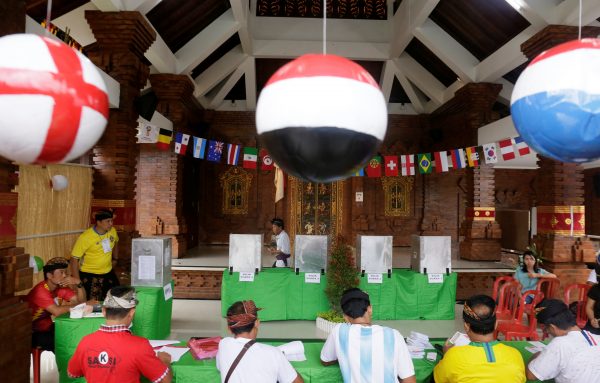The tensions between symbolic victories and practical outcomes is a theme of this week’s lead article, in which Liam Gammon reviews the political fallout from the cancellation of Indonesia’s hosting of the FIFA U-20 World Cup. After local politicians criticised the inclusion of the Israeli team — invoking security risks and Indonesia’s long-standing support for the Palestinian cause — FIFA lost confidence in Indonesia’s ability to host the tournament and pulled its host rights, just weeks before the tournament was set to begin.
Indonesians are no fans of the Israeli government, with sympathy for the cause of the Palestinians arising from a sense of religious solidarity and anti-colonialism. Indonesia maintains quiet and informal economic and defence relationships with Israel but the idea of recognising the Jewish state is a political no-go zone for now, especially given the intensifying brutality of Israel’s occupation of Palestinian territories.
It would seem that the politicians decrying Israeli participation in the tournament were on a winner. But as Gammon writes, they misjudged the Indonesian electorate’s comparative enthusiasm for symbolic victories versus bread and much loved circuses. Notwithstanding the sincere concern many Indonesians have for the Palestinian cause, bread and circuses won the day. As Gammon writes, ‘in the aftermath of the tournament’s cancellation, the discussion hasn’t been dominated by triumphalism about the sacrifices made in the name of showing solidarity with Palestine but rather the economic benefits that have been lost, and the missed opportunity for the international spotlight to shine positively on Indonesia’. Indeed, ‘if there’s a silver lining to this fiasco, it is what it has revealed about the pragmatism of the Indonesian public’.
Pandering to public opinion might have been beside the point. Factional manoeuvring ahead of the February 2024 presidential elections lies behind the outcry against the Israeli team’s participation. President Joko Widodo has endured the collapse of a prestige project of his government thanks to the interventions of members of his own coalition, Gammon explains.
The objection to Israeli participation — on ostensibly anti-colonial grounds — from the nationalist PDI-P party to which President Widodo is affiliated has proved a major political misjudgement of the popular mood. As Gammon details, the party’s chair, former president Megawati Soekarnoputri, ‘quietly ordered local leaders from her party to oppose the Israeli team’s involvement. One of those local leaders happens to be Ganjar Pranowo, the Central Java governor who was widely considered the frontrunner to win the February 2024 presidential race. With Ganjar trying to prove his bona fides as a reliable servant of PDI-P as he seeks the party’s presidential nomination, he duly fell into step with the party line, loudly opposing letting the Israeli team play’.
Ganjar might have passed Megawati’s loyalty test. But he’s done so at the cost of his political standing and possibly also his ambition for the presidency.
Lying among the mess is a reality check about the limits of Widodo’s ability to dictate political outcomes as his term in office draws to a close. As the deadline for his coalition partners to set up presidential tickets draws close, the president is understandably anxious not to see the coherence of his coalition as the elections approach, though an approval rating hovering around the 75 per cent mark should give his parties incentive to pitch themselves as forces for policy continuity.
The U-20 World Cup episode at the same time lays bare some fallacies of poll-driven politics. Voters consider and contextualise abstract aspirations — such as support for Palestine — within a hierarchy of preferences and interests in which economic concerns are usually among the most dominant.
There is a broad lesson for the policy approach to be taken by the new president that Indonesians will elect in February 2024, who, despite the strong economic record of the Widodo presidency, will still inherit an economy held back from its potential by barriers to trade and investment and competition. The new president can proceed in the knowledge that when push comes to shove, the electorate will, in aggregate, tend to reward immediate benefits over ideological purity, something as true of commitment to foreign affairs (including Israel and Palestine) as it is of economic policy. That lesson applies to more open economic policies that can lift growth potential — something that may seem politically difficult but can win and sustain popular support.
Indonesia has a big opportunity as chair of ASEAN this year and the permanent co-chair of the RCEP joint committee to shape the future of East Asia’s economic order. If they get the messaging right, Indonesian leaders need not let the fear of getting too far out in front of public opinion limit either the scope for economic reform at home or policy ambition on the regional stage.
The EAF Editorial Board is located in the Crawford School of Public Policy, College of Asia and the Pacific, The Australian National University.

